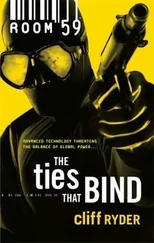These days she was doing the best she could financially. It wasn’t too bad. Her job was a good one. She was well paid and had considerable benefits. She would never be rich in her field, but then she hadn’t chosen nursing for the money.
Pulling into the driveway of her cream stucco home, she pushed the button on the remote garage door opener and drove into the garage. She kicked off her shoes as she stepped inside and picked up the stack of mail her neighbor, Tanisha Davis, had been bringing in. Tanisha was also a single working mother, and she and Rachel had a solid friendship.
Sorting through the mail, Rachel mechanically threw out the junk and filed away the bills. It was twelve-thirty now, so she decided to fix lunch for herself before returning to the hospital.
A glance in the fridge revealed it was virtually empty. Rachel gingerly peeked into a tub of cottage cheese, noting it was beyond its use-by date, and hurriedly tossed it into the trash bin. She then eyed the splash of milk remaining in the jug and decided to use it since its date suggested it was still fresh. She grabbed a can of tomato soup from the cupboard and prepared it to heat on the stove.
Rachel ran upstairs, knowing she needed to gather some clothing to take with her to the hospital. She smiled at the piles of clean laundry her mother had left on her bed. What would I have done without Mamá to help me?
Or, to be fair, what would I have done without everybody’s help?
If she continued to think along these lines, Rachel would be crying soon. She felt weak today, worn out from meeting with Lucas. She could understand the weakness, but that didn’t mean she had to give in to it.
And yet, she was so tired. So tense inside.
She shook off the thoughts and stripped off her suit, carefully hanging it in the closet. She pulled on pale blue jeans and a T-shirt in primary color stripes. She slipped on her sandals and reached for a small suitcase at the top of the closet. Quickly she loaded it with clean undergarments and headed back down the stairs. She poured her soup into a large mug and returned to the living room. Settling on the couch, she whispered a brief prayer and began sipping.
Thoughts, emotions, memories. They were bombarding her. This time she would be unable to stop them.
Things had gone so wrong. But what choice did I have? How long was I supposed to take it, try to ignore it, pretend it didn’t matter to me? After all, Las Vegas had been the last straw—it hadn’t been the only straw. There came a point when enough was simply, truly enough. Right?
Ayuda, she knew, ayuda had saved her then. It continued to sustain her now.
Ayuda, that particular Mexican form of “circling the wagons” to support, aid and protect anybody considered part of the group. It existed, of course, in any culture, but it was an ever-present force in the Mexican mind-set, simply more visible at some times than at others.
Rachel’s familia was a large group. Of course, it included grandparents, parents, aunts and uncles, her brother—the obvious people. Some members were called cousins and were actually related in traditional ways. Others were called cousins simply because it was a convenient title and the actual relationship was too complicated to explore. Familia extended to certain friends and friends of friends, and to those who married into it. Rachel’s father, Mike Shannon, was one such member, affectionately referred to as el gringo. This title acknowledged his non-Hispanic background, simply, easily—but it also marked him as someone included in the familia by choice.
Rachel’s familia had watched her marry outside their circle, welcoming her young man because she had chosen him. He had been brought in unreservedly, had been granted a place within their group because of his connection with Rachel. They had watched the early happiness, shaking their heads in bewilderment over how such a fine young man could have sprung from such cold, overbearing, narrow-minded people as his parents.
They continued to watch as Lucas had veered away from life with Rachel. Rachel had never said anything, and, out of respect, they had never mentioned it to her. But they knew she knew.
When the day came that she appeared at her brother’s door, he knew exactly why she was there. Rick had been ready to help her, just as anyone in their circle would have been. Quickly news of her wounded status had spread, and family and friends had rallied around her. They had, in fact, circled the wagons—kept her safe until she was ready to face the world again. Because her state was regarded as unresolved, they remained on high alert where she was concerned. They knew she needed room to appear independent, to save face in public, but they also knew they had to be ready to support her.
In earlier times Lucas Neuman might well have found himself on the wrong end of violent vengeance. In the eyes of Rachel’s people, not only had he betrayed her—he had deceived the entire group. In doing so, he had demonstrated his lack of character. Instead of violence, however, they elected to monitor his activities. They talked amongst themselves, quietly, gradually spreading word of Lucas Neuman beyond Rachel’s immediate group. Of course, Arnold Neuman had already made a questionable name for himself. It was no great difficulty to suggest, with a shrug, De tal palo, tal astilla. An apple never falls far from the tree.
Rachel would have been surprised had anyone told her they kept tabs on Lucas and that they knew exactly what he’d been doing since she’d left him. She tried not to think of him at all.
She had loved him deeply and completely. He had loved her in return. Whatever she had questioned—and she’d had many questions—she had never doubted that he loved her. That’s why his behavior had been so hard to understand. He had just drifted away, following his parents and Alana, almost like a sleepwalker.
They had been happy together at first, she and Lucas. They had led a simple life, largely because they hadn’t had enough time or money for anything complicated. They had both been university students, living in a dumpy little apartment within walking distance of the campus. Others in the complex had “partied hearty,” staying up late, carrying on. But Lucas and Rachel had lived quietly. Sunsets had been nice for them. Ice cream on Saturday mornings had been nice. Spending Sundays in bed, or hurrying to make morning classes because lovemaking had gone into overtime—that had been nice, too. Grocery shopping and laundry duties had been times to spend together, not chores. Music had always been there; they’d enjoyed dancing, even when it was just the two of them in the kitchen. Especially when it was only the two of them in the kitchen. They’d laughed together, they’d had private jokes. They’d been in love, but it had been more than that. They had matched each other. And there had always been a sense of a future together.
Rachel had believed she knew Lucas, knew who he really was, right to his core. Even when things had begun falling apart, she had been able to see the person he was. Deep inside. Down to his soul. Just as he had been able to see hers.
Maybe we were too young, Rachel considered, swishing the dregs of her tomato soup. She’d only been nineteen, Lucas, twenty, when they’d married. Too young was a possibility. It was a major objection offered by Lucas’s parents. But that, Rachel knew, was only because it was a socially acceptable thing to say. The real problem was that Rachel was not, and could never be, what the Neumans wanted for their son’s wife. Specifically, she was not Alana Winston—a woman who had been groomed for just that role. Or for a role just like it, anyway. And she’d had her sights set on Lucas for a long time.
Alana Winston was everything Rachel was not. Most importantly, in the Neumans’ opinion, her pedigree was impeccable. Rachel’s was not. After all, Rachel’s mother was Hispanic. She had been born in Mexico, and happily acknowledged that she had as much family living on the American side of the border as on the Mexican side. She spoke Spanish and she’d taught Rachel and her brother to speak Spanish, as well. Her father, a white man, had done nothing to discourage their ethnic tendencies—he even seemed proud of them. As far as the Neumans were concerned, that was nearly worse than the existence of the ethnicity in the first place.
Читать дальше












